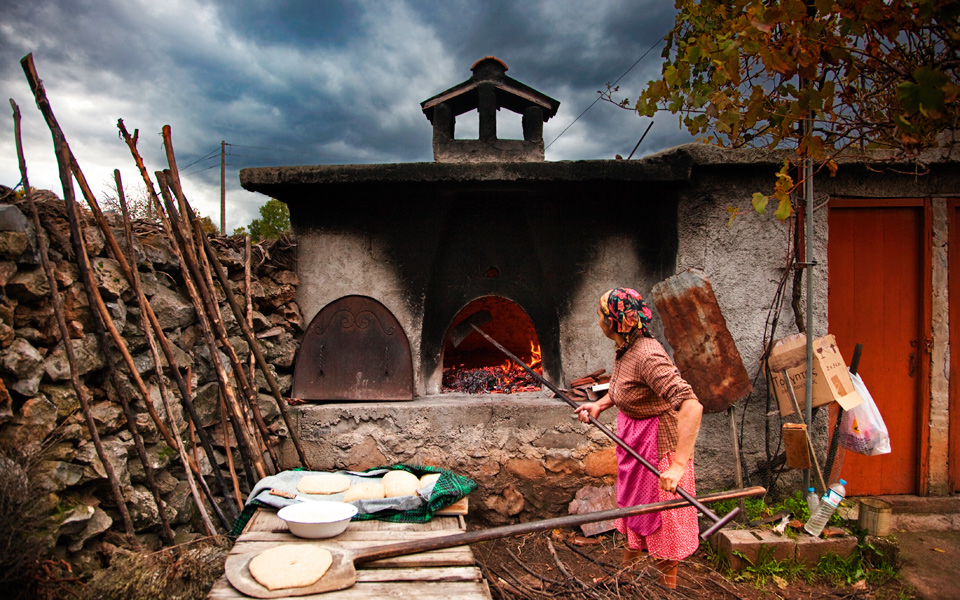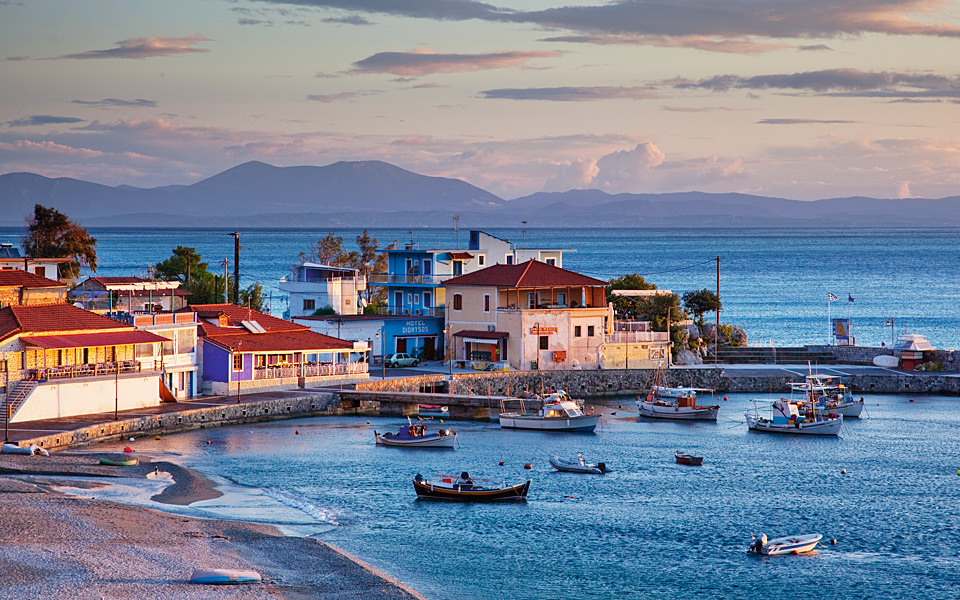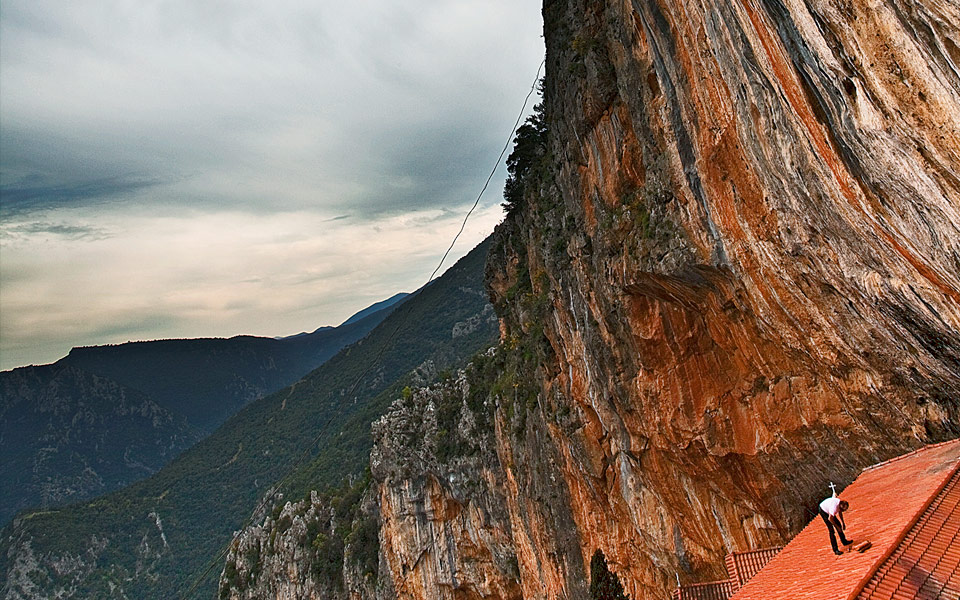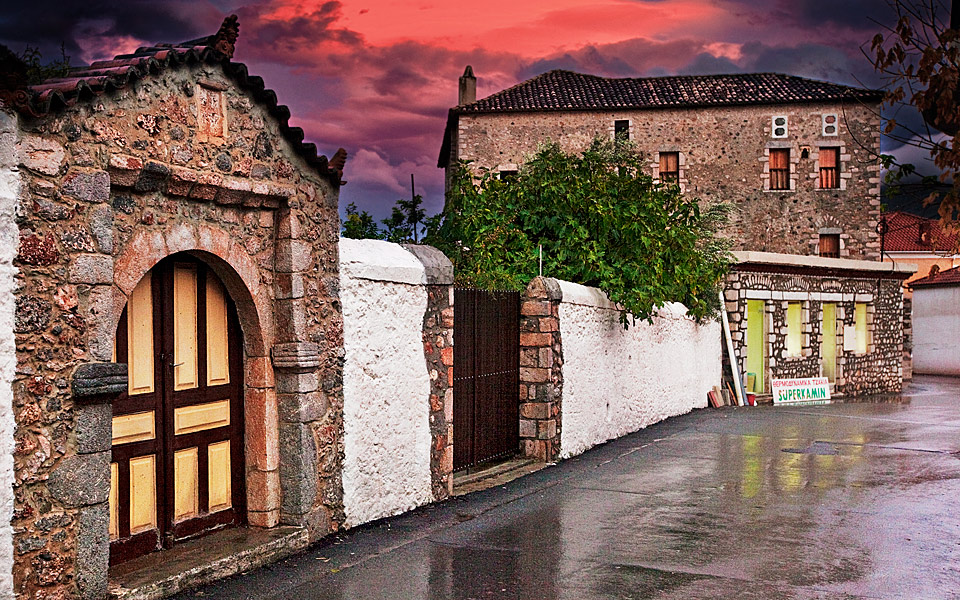Springtime in Arcadia: What to See, Do and...
Just a short distance from Athens,...

A local woman from Tsakonia baking bread and pies in an outdoor stone oven.
© Perikles Merakos
Leonidio is a small Arcadian seaside town that marches to the beat of its own drum, the stopping point of the coastal road that runs through Nafplio and Astros before winding its way up the mountain to reach Sparta. Leonidio was once the capital of Tsakonia, a region comprising several villages and hamlets that are distinguished for their dialect, which appears to originate from the ancient Doric dialect, and customs reverently preserved to the present day. The people of Leonidio are proud of their heritage and this is evident as soon as you enter the town, where signposts are written in the Tsakonian dialect, with the Modern Greek translation below.
The narrow streets of Leonidio are more conducive to walking or cycling and cannot accommodate large cars. But this is also the best way to explore its historical landmarks, beautifully renovated mansions and towers that date to before 1800. It is these towers and the neoclassical buildings from the 19th century that earned Leonidio protected status as a traditional village of historical importance.
“ The people of Leonidio are proud of their heritage and this is evident as soon as you enter the town, where signposts are written in the Tsakonian dialect, with the Modern Greek translation below. ”

The coastal village of Plaka serves as Leonidio’s seaport.
© Perikles Merakos
Named capital of Cynuria (Kynouria) in 1845, it evolved mainly thanks to its seafaring merchants who traveled far and wide, amassed wealth and built beautiful homes in their place of birth. Leonidio today has some 3,500 residents and is a relatively lively town with plenty of tavernas, cafés and welcoming lodgings.
A long, straight road cuts across the small Leonidio plan leading to the seaport of Plaka, and it is flanked by orange and lemon groves, tomato and potato fields, as well as it most famous crop: the sweet Tsakonian eggplant. Locals prepare this purple gem in myriad ways: stuffed, broiled, fried, baked with cheeses, puréed, as a pizza topping, in spaghetti sauce and wrapped in crispy fylo pastry. If you follow the road to the right, it will take you to Poulithra, a picturesque seaside village with a good selection of accommodation and eateries. The road then starts to wind up Mount Parnon, passing through small hamlets and magical landscapes. Despite the beauty of the mountain, with its stunning sea views, many of the villages are all but abandoned as the local people sought work on the coast or the country’s bigger cities. Most have just a handful of permanent residents, a few visitors at weekends and small establishments that double as the local café and taverna.

A man repairs the roof of Panaghia Elonis.
© Perikles Merakos
Leonidio also marks the start of the road that leads to the mountain border of Arcadia with Laconia. The first stop on this route is the village of Kosmas. Located at an altitude of 1,150 meters, for years it served as a rest stop for travelers exploring Parnon on their way from Arcadia to Sparta. Resisting a short stop at Kosmas is hard when you encounter the beautiful village square, shaded by three massive, age-old plane trees and boasting a pretty fountain with three spouts gushing fresh mountain water, located behind the church on the side of the square. The atmosphere up here is so clear you can see all the way to the island of Spetses, and a number of cozy and inviting hotels and pensions have sprung up in recent years around the village center. These are popular for weekend romances, cuddled up by the fire, warming limbs chilled by bracing hikes or off-road drives on Mount Parnon.
“ The atmosphere up here is so clear you can see all the way to the island of Spetses, and a number of cozy and inviting hotels and pensions have sprung up in recent years around the village center. ”

Most of the streets that criss-cross Leonidio are flanked by small stone houses with pretty gardens.
© Perikles Merakos
Leaving Kosmas will bring you to the “100-day road” leading to Geraki in Laconia. The road was thus nicknamed because in 1951 the residents of the village decided to raise the money needed to make a proper road and managed, with a little help from the state, to complete the project within 100 days, welcoming the first car from Geraki. This is the road to take if you’re planning to continue with a tour of Laconia. The situation is much better in the village today, as it has a few dozen permanent residents in the winter and quite a few weekenders and tourists. The other villages in the vicinity are even smaller and more sparsely populated: Paleochori, Platanaki and Aghios Vassilis are tiny hamlets worth exploring along the trails that link them, offering a glimpse into the simple rural life. Life here proceeds at a slower pace for the locals, who grow what they eat and remain unaffected by modern trends both in their way of life and their culture.
Just a short distance from Athens,...
In Leonidio, Easter comes alive with...
When the summer crowds depart, Greece’s...
Ten must-do experiences in Athens, from...